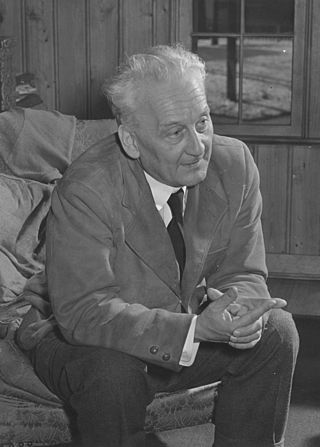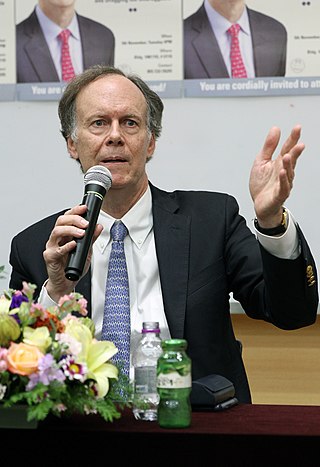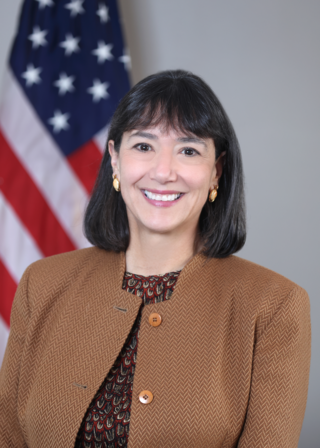Related Research Articles

Stanley Joel Korsmeyer was an American research scientist known for his work on B cell lymphomas and apoptosis. Born and educated in the US state of Illinois,Korsmeyer spent most of his career as a professor at Washington University School of Medicine and later the Dana–Farber Cancer Institute. He rose to prominence in the early 1980s as a research fellow at the National Cancer Institute. There he co-discovered the genetic cause of most cases of the cancer follicular lymphoma –the misregulation of the gene Bcl-2. Korsmeyer went on to start his own laboratory at Washington University in St. Louis,further studying the role of Bcl-2 in cell biology. His group's work expanded the paradigm of cancer-causing genes,providing the first example of how interfering with programmed cell death could lead to cancer development. Korsmeyer authored over 250 scientific papers over the course of his career. He was elected to the U.S. National Academy of Sciences at the age of 45. Korsmeyer died of lung cancer in 2005,at the age of 54.
Dana-Farber Cancer Institute (DFCI) is a comprehensive cancer treatment and research center in Boston,Massachusetts. Dana-Farber is the founding member of the Dana-Farber/Harvard Cancer Center,Harvard's Comprehensive Cancer Center designated by the National Cancer Institute,and one of the 15 clinical affiliates and research institutes of Harvard Medical School.

Emil "Tom" Frei III was an American physician and oncologist. He was the former director and former physician-in-chief of the Dana–Farber Cancer Institute in Boston,Massachusetts. He was also the Richard and Susan Smith Distinguished Professor of Medicine at Harvard Medical School.

Ronald A. DePinho is an American physician and research scientist. He served as president of MD Anderson Cancer Center from 2011 to 2017. DePinho states that his concern for reducing the burden of cancer suffering became his life goal in 1998,when his father died of colon cancer.
Laurie Hollis Glimcher is an American physician-scientist who was appointed president and CEO of Dana–Farber Cancer Institute in October 2016. She was elected a member of the American Philosophical Society in 2019. Glimcher has been at the center of controversies related to animal rights activists,excessive corporate payments,and research misconduct. A 2021 investigation by the Boston Globe Spotlight team highlighted Glimcher’s activities on multiple corporate boards,including Bristol Myers Squibb,GlaxoSmithKline,and Analog Devices. After this investigation,Glimcher continued to receive compensation on for-profit boards,while doubling her salary to $4 million per year at Dana-Farber.

James Patrick Allison is an American immunologist and Nobel laureate who holds the position of professor and chair of immunology and executive director of immunotherapy platform at the MD Anderson Cancer Center in Houston,Texas. Allison is Regental Professor and Founding-Director of James P. Allison Institute at the MD Anderson Cancer Center.

The Szent-Györgyi Prize for Progress in Cancer Research,established by National Foundation for Cancer Research (NFCR) and named in honor of Albert Szent-Györgyi,Nobel laureate and co-founder of NFCR,has been awarded annually since 2006 to outstanding researchers whose scientific achievements have expanded the understanding of cancer and whose vision has moved cancer research in new directions. The Szent-Györgyi Prize honors researchers whose discoveries have made possible new approaches to preventing,diagnosing and/or treating cancer. The Prize recipient is honored at a formal dinner and award ceremony and receives a $25,000 cash prize. In addition,the recipient leads the next "Szent-Györgyi Prize Committee" as honorary chairman.
Edward J. Benz Jr. is the former president of Dana–Farber Cancer Institute in Boston,Massachusetts.,and the Richard and Susan Smith Professor of Medicine as well as a professor of genetics at Harvard Medical School.
Lynda Chin is a Chinese-American medical doctor. She is a board-certified dermatologist who was the founding department chair and professor of genomic medicine at the University of Texas MD Anderson Cancer Center,as well as scientific director of the MD Anderson Institute for Applied Cancer Science. In late 2012 she was elected as a member of the Institute of Medicine (IOM) of the National Academies.

William G. Kaelin Jr. is an American Nobel laureate physician-scientist. He is a professor of medicine at Harvard University and the Dana–Farber Cancer Institute. His laboratory studies tumor suppressor proteins. In 2016,Kaelin received the Albert Lasker Award for Basic Medical Research and the AACR Princess Takamatsu Award. He also won the Nobel Prize in Physiology or Medicine in 2019 along with Peter J. Ratcliffe and Gregg L. Semenza.
Michael A. Caligiuri is an American physician scientist focused on oncology and immunology. He is currently the president of the City of Hope National Medical Center and the Deana and Steve Campbell Physician-in-Chief Distinguished Chair. He was elected president of the American Association for Cancer Research,the world's largest cancer research organization,for 2017–2018. He was previously the CEO of the James Cancer Hospital (2008-2017),Director of the Comprehensive Cancer Center (2003-2017),and Director of the Division of Hematology-Oncology (2000-2008) at the Ohio State University. He was elected to the United States National Academy of Medicine in 2018.
David M. Livingston was the Deputy Director of the Dana-Farber/Harvard Cancer Center,Emil Frei Professor of Genetics and Medicine at Harvard Medical School,Chairman of the Executive Committee for Research at Dana–Farber Cancer Institute. Dr. Livingston joined the Harvard faculty in 1973. His research focused on breast and ovarian cancer.

Juanita L. Merchant is an American gastroenterologist and physiology researcher who has contributed to understanding of gastric response to chronic inflammation. She is currently the chief of the University of Arizona Division of Gastroenterology and Hepatology. Merchant was elected to the National Academy of Medicine in 2008,and appointed an inaugural member of the NIH Council of Councils.
Catherine J. Wu is an American physician-scientist who studies oncology. She is a Professor of Medicine and Chief of Division of Stem Cell Transplantation and Cellular Therapies at the Dana–Farber Cancer Institute. Her research focuses on longitudinal studies of patients with chronic lymphocytic leukemia (CLL).
Roy S. Herbst is an American oncologist who is the Ensign Professor of Medicine,Professor of Pharmacology,Chief of Medical Oncology,and Associate Director for Translational Research at Yale Cancer Center and Yale School of Medicine in New Haven,Connecticut.
Cheryl Lyn Walker is an American molecular biologist.
Margaret Ann Shipp is an American hematologic oncologist. She is the Douglas S. Miller Chair in Hodgkin Lymphoma at Harvard Medical School. Shipp is an elected Fellow of the American Society for Clinical Investigation and National Academy of Medicine.

Monica Bertagnolli is an American surgical oncologist and the 17th director of the National Institutes of Health. She previously served as the 16th director of the National Cancer Institute (NCI). Prior to her governmental positions,she worked at Brigham and Women's Hospital and Dana–Farber Cancer Institute and was the Richard E. Wilson Professor of Surgery at Harvard Medical School.
Matthew Langer Meyerson is an American pathologist and the Charles A. Dana Chair in Human Cancer Genetics at the Dana-Farber Cancer Institute. He is also director of the Center for Cancer Genomics at the Dana-Farber Cancer Institute,and the Director of Cancer Genomics at the Broad Institute of MIT and Harvard.
David Piwnica-Worms is an American radiologist and biochemist. He is the Gerald Dewey Dodd Jr.,Endowed Distinguished Chair in Diagnostic Imaging and a professor of Cancer Systems Imaging and Professor of Cancer Biology at The University of Texas MD Anderson Cancer Center. He also serves as the chair of the Department of Cancer Systems Imaging at the same institution.
References
- ↑ "Piwnica-Worms, Helen Margaret, 1957-". Library of Congress. Retrieved October 1, 2021.
- 1 2 3 "Helen Piwnica-Worms, Ph.D." MD Anderson Cancer Center. Retrieved October 6, 2021.
- ↑ "Helen Piwnica-Worms". MD Anderson Cancer Center. Retrieved 2022-08-21.
- 1 2 Simner, Janni L. (Spring 2009). "To Control Cancer's Spread". Washington University. Archived from the original on October 7, 2021. Retrieved October 6, 2021.
- ↑ Groetsch, Kristin (2001). "Women in Medicine". Washington University. Retrieved October 6, 2021.
- ↑ "Helen M. Piwnica-Worms". American Academy of Arts and Sciences. Retrieved October 6, 2021.
- ↑ Purdy, Michael C. (March 8, 2011). "Helen Piwnica-Worms named head of cell biology and physiology". Washington University School of Medicine. Retrieved October 6, 2021.
- ↑ "Versatile Bench-to-Bedside Scientist, Research Leader Helen Piwnica-Worms Appointed Vice Provost, Science, at UT MD Anderson Cancer Center". Newswire. February 15, 2013. Retrieved October 6, 2021.
- ↑ "Waun Ki Hong and Helen Piwnica-Worms elected to Institute of Medicine". Newswire. October 22, 2013. Retrieved October 6, 2021.
- ↑ "Triple negative breast cancers can adopt reversible state that is resistant to chemotherapy". MD Anderson Cancer Center. April 17, 2019. Retrieved October 6, 2021.
- ↑ "Why I Give: Learn More About TAMEST Members Drs. Helen and David Piwnica-Worms". Academy of Medicine, Engineering and Science of Texas. Retrieved October 6, 2021.